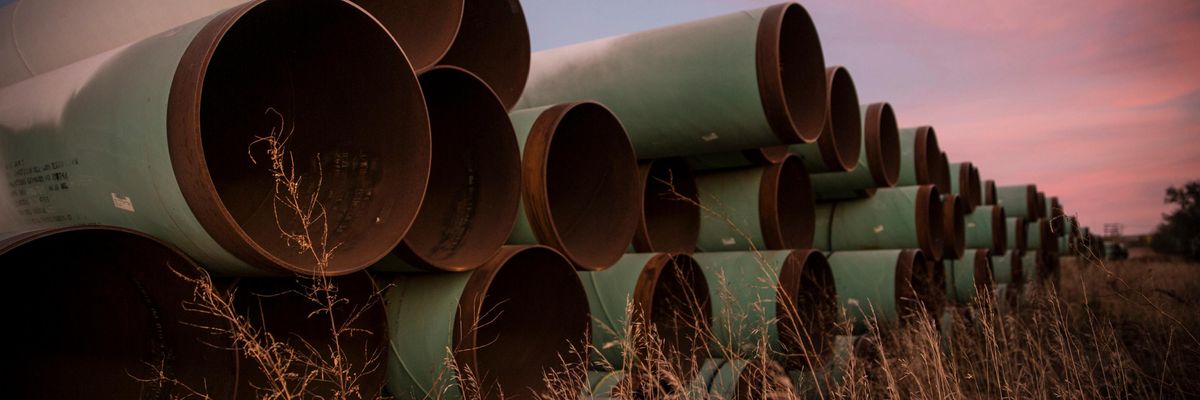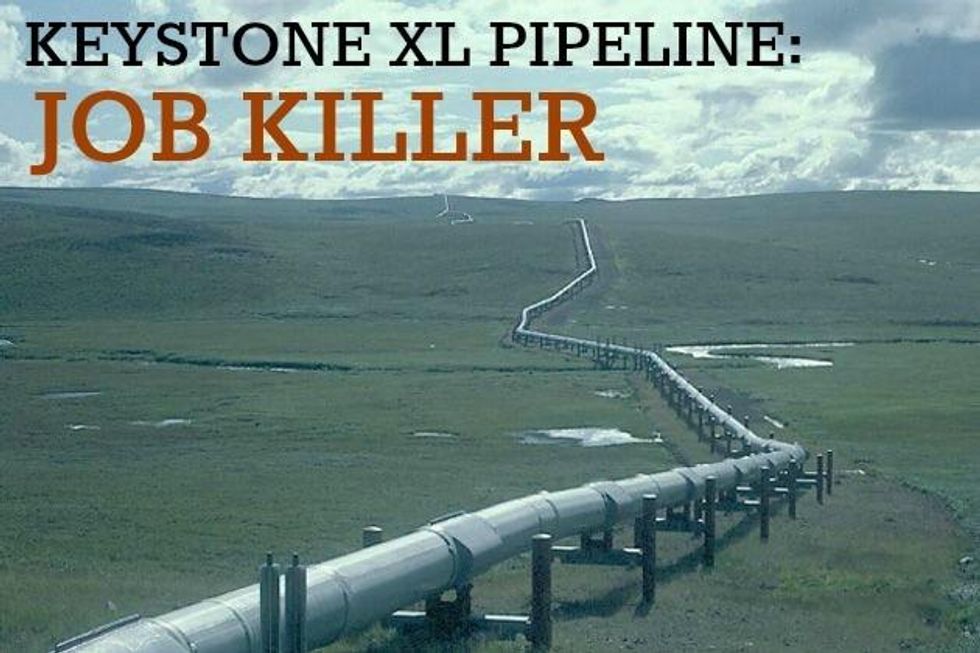The American labor movement is once again facing a most controversial issue -- the construction of the Keystone XL pipeline. While the KXL debate has largely centered around the environmental risks, from labor's perspective opening up the Canadian Tar Sands is often seen as an economic, not an environmental, issue. And it's no wonder: Construction unemployment is double the national average and, from a worker's perspective, Keystone jobs will be good-paying union jobs in an economy that increasingly offers up only minimum-wage service work.
As AFL-CIO President Richard Trumka explained last year, "mass unemployment makes everything harder and feeds fear. . . opponents of the pipeline [need to] recognize that construction jobs are real jobs, good jobs." KXL advocates have worked hard to capitalize on this fear by arguing that labor must choose between creating jobs and protecting the planet.
While labor leaders weigh the pros and cons of building KXL, they should keep in mind that the pipeline is as much a threat to our economy as it is to our planet. After a year of extreme weather -- at an extreme cost to the economy -- this age old jobs vs. environment debate is emerging as a false choice. Hurricanes, floods, and droughts are already having a devastating effect on American jobs, and that is nothing compared to what will happen if we throw open the spigot to the tar sands from Canada, considered the dirtiest oil in the world.
Here are 5 reasons why building the Keystone pipeline is bad for the economy -- and workers.
1. Building the Keystone pipeline and opening up the Tar Sands will negatively impact national and local economies: Burning the recoverable tar sands oil will increase the earth's temperature by a minimum of 2 degree Celsius, which NYU Law School's Environmental Law Center estimates could permanently cut the US GDP by 2.5%. At the same time state and local economies are already buckling under the real-time economic effects of our nation's dependence on fossil fuels. In the past two years, the vast majority of U.S. counties - 67 percent - were affected by at least one of the eleven $1 billion dollar extreme weather events. Superstorm Sandy alone caused an estimated $80 billion in damage. The drought that affected 80% of US farmland last summer destroyed a quarter of the US corn crop and did at least $20 billion damage to the economy.
2. The same fossil fuel interests pushing the Keystone pipeline have been cutting, not creating, jobs: Despite generating $546 billion in profits between 2005 and 2010, ExxonMobil, Chevron, Shell, and BP reduced their U.S. workforce by 11,200 employees over that period. In 2010 alone, the top five oil companies slashed their global workforce by 4,400 employees -- the same year executives paid themselves nearly $220 million. But at least those working in the industry as a whole get paid high wages, right? Turns out that 40 percent of U.S oil-industry jobs consist of minimum-wage work at gas stations. Instead of bankrolling an industry that is laying off workers and threatening our economic future, isn't it time to take the billions in subsidies going to oil companies and invest instead in a sector that both creates jobs and protects the planet?
3. Unemployment will rise: According to Mark Zandi, the Chief Economist of Moody's Analytics: "Superstorm Sandy wreaked havoc on the job market in November, slicing an estimated 86,000 jobs from payrolls." In the wake of Hurricane Irene, the number of workers filing unemployment claims in Vermont went from 731 before Irene to 1,331 two weeks afterwards. Hurricane Katrina wiped out 129,000 jobs in the New Orleans region -- nearly 20 percent. For the U.S. economy as a whole, 2011 cost US taxpayers $52 billion.
4. Poor and working people will be disproportionately affected: KXL and projects like it result in disproportionately negative impact on already struggling working families. According to a recent report by the Center for American Progress called "Heavy Weather: How Climate Destruction Harms Middle- and Lower-Income Americans, lower-and middle income households are disproportionately affected by the most expensive extreme weather events. Sixteen states were afflicted by five or more extreme weather events in 2011-12. Households in disaster-declared counties in these states earn $48,137, or seven percent below the U.S. median income.
5. Building the sustainable economy, not the Keystone pipeline, will create far more jobs: Our nation is in desperate need of jobs. Approving the Keystone pipeline locks our nation into a trajectory of guaranteed job loss and threatens the stability of the US economy. Why keep the "job-killing" course, when the alternative-energy path is already out-performing other sectors of the economy. For example, the solar industry continues to be an engine of job growth -- creating jobs six times faster than the overall job market. Research by the Solar Foundation shows a 13 percent growth in high-skilled solar jobs spanning installations, sales, marketing, manufacturing and software development -- bringing total direct jobs to 119,000 in the sector. And according to the Political Economy Research Institute at the University of Massachusetts-Amherst, investment in a green infrastructure program would create nearly four times as many jobs as an equal investment in oil and gas.
A study by Synapse Energy Economics developed a Transition Scenario for the electric power industry based on reducing energy consumption, phasing out high-emission power plants, and building new, lower-emission energy facilities. The study estimated the number of "job years" -- one new worker employed for one year -- that would be created by the Transition Scenario over a decade:
- 444,000 job-years for construction workers, equivalent to 44,400 construction workers working full time for the entire decade.
- 90,000 job-years for operations and maintenance workers, equivalent to about 9,000 full time workers employed over the decade.
- 3.1 million indirect jobs for people designing, manufacturing, and delivering materials and jobs in local economies around the country induced by spending by workers hired in the Transition Scenario.
Organized labor is right to demand that public policy pay attention to our desperate need for jobs. But the Keystone XL pipeline will only make our jobs crisis worse by making our climate crisis worse. Plus, there are lots of pipelines that need fixing. Construction workers can be put to work rebuilding our crumbling natural gas transmission pipeline system -- this will create good union jobs and cut carbon emissions. And these same workers can rebuild our crumbling water infrastructure. If labor is going to fight for jobs, let's fight for jobs that build the future we want for ourselves and our children, not ones that will destroy that future.


